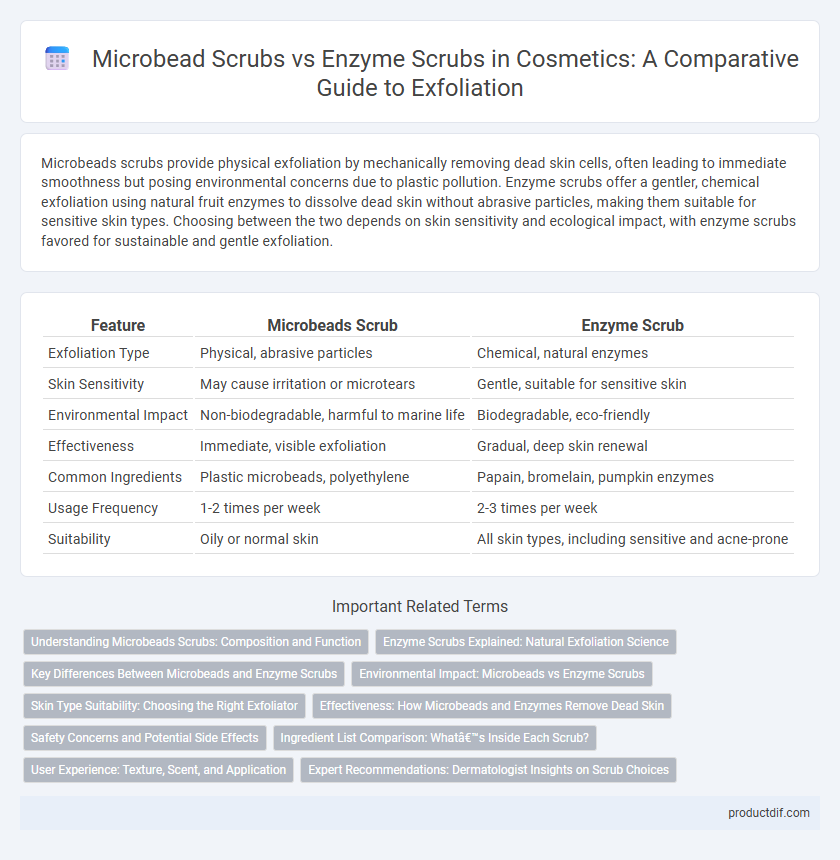Microbeads scrubs provide physical exfoliation by mechanically removing dead skin cells, often leading to immediate smoothness but posing environmental concerns due to plastic pollution. Enzyme scrubs offer a gentler, chemical exfoliation using natural fruit enzymes to dissolve dead skin without abrasive particles, making them suitable for sensitive skin types. Choosing between the two depends on skin sensitivity and ecological impact, with enzyme scrubs favored for sustainable and gentle exfoliation.
Table of Comparison
| Feature | Microbeads Scrub | Enzyme Scrub |
|---|---|---|
| Exfoliation Type | Physical, abrasive particles | Chemical, natural enzymes |
| Skin Sensitivity | May cause irritation or microtears | Gentle, suitable for sensitive skin |
| Environmental Impact | Non-biodegradable, harmful to marine life | Biodegradable, eco-friendly |
| Effectiveness | Immediate, visible exfoliation | Gradual, deep skin renewal |
| Common Ingredients | Plastic microbeads, polyethylene | Papain, bromelain, pumpkin enzymes |
| Usage Frequency | 1-2 times per week | 2-3 times per week |
| Suitability | Oily or normal skin | All skin types, including sensitive and acne-prone |
Understanding Microbeads Scrubs: Composition and Function
Microbeads scrubs consist of tiny, synthetic polymer beads designed to physically exfoliate the skin by removing dead cells and unclogging pores, enhancing skin texture and smoothness. These microbeads often comprise polyethylene or polypropylene, which provide uniform abrasion but pose environmental concerns due to their non-biodegradable nature. Functionally, microbeads scrubs offer immediate, tactile exfoliation, promoting skin renewal and improving the absorption of skincare products.
Enzyme Scrubs Explained: Natural Exfoliation Science
Enzyme scrubs utilize natural fruit enzymes such as papain and bromelain to gently dissolve dead skin cells, offering a chemical exfoliation alternative to abrasive microbeads scrubs. Unlike microbeads, which are often plastic-based and can harm the environment, enzyme scrubs provide eco-friendly exfoliation by breaking down keratin without mechanical friction. This natural exfoliation boosts skin renewal, improves texture, and reduces irritation, making enzyme scrubs suitable for sensitive and acne-prone skin types.
Key Differences Between Microbeads and Enzyme Scrubs
Microbeads scrubs contain tiny synthetic particles that physically exfoliate by scrubbing away dead skin cells, offering immediate smoothness but raising environmental concerns due to non-biodegradability. Enzyme scrubs utilize natural enzymes from fruits like papaya or pineapple to gently dissolve dead skin cells, promoting a chemical exfoliation that is suitable for sensitive skin types. Key differences include the mechanism of exfoliation--physical versus chemical--and the environmental impact, with enzyme scrubs being eco-friendlier and less abrasive.
Environmental Impact: Microbeads vs Enzyme Scrubs
Microbeads scrubs contain tiny plastic particles that contribute significantly to ocean pollution and harm marine life by entering the food chain. Enzyme scrubs use natural fruit-derived enzymes that biodegrade harmlessly, posing no risk to aquatic ecosystems. Choosing enzyme scrubs supports sustainable skincare practices and reduces plastic waste in water bodies.
Skin Type Suitability: Choosing the Right Exfoliator
Microbeads scrubs are abrasive and best suited for normal to oily skin, effectively removing dead skin cells but may cause irritation for sensitive skin types. Enzyme scrubs contain natural fruit enzymes like papain or bromelain, offering gentle exfoliation ideal for sensitive, dry, or mature skin without physical abrasion. Selecting the right exfoliator depends on skin sensitivity and type, where enzyme scrubs provide a safer option for delicate skin, while microbeads can deliver more intensive exfoliation for resilient skin.
Effectiveness: How Microbeads and Enzymes Remove Dead Skin
Microbeads physically exfoliate by abrasive action, effectively sloughing off dead skin cells from the surface, promoting immediate smoothness and improved texture. Enzyme scrubs utilize natural proteolytic enzymes, such as papain or bromelain, to gently dissolve dead skin and impurities at a cellular level, enhancing skin renewal without irritation. Enzyme scrubs are often preferred for sensitive or acne-prone skin due to their mild yet effective exfoliating properties compared to the mechanical abrasion of microbeads.
Safety Concerns and Potential Side Effects
Microbeads scrubs, often made from non-biodegradable plastic, pose environmental hazards and potential skin irritation due to their abrasive particles and chemical additives. Enzyme scrubs, derived from natural fruit enzymes like papain or bromelain, generally offer a safer alternative by gently exfoliating without mechanical abrasion, reducing risks of microtears and inflammation. Users with sensitive skin should still perform patch tests, as enzymatic activity can cause mild irritation or allergic reactions in some individuals.
Ingredient List Comparison: What’s Inside Each Scrub?
Microbeads scrubs typically contain synthetic polymer beads such as polyethylene or polypropylene, designed to physically exfoliate the skin by sloughing off dead cells. Enzyme scrubs rely on natural fruit enzymes, like papain from papaya or bromelain from pineapple, which chemically dissolve dead skin cells for a gentler exfoliation. Unlike microbeads, enzyme scrubs often include additional botanical extracts and mild surfactants, prioritizing skin sensitivity and eco-friendliness.
User Experience: Texture, Scent, and Application
Microbeads scrubs offer a gritty texture that provides intense exfoliation, often accompanied by a fresh or floral scent that enhances the sensory experience during application. Enzyme scrubs present a smoother, creamier texture with natural fruit-based aromas, allowing gentle exfoliation suitable for sensitive skin. Both options offer unique tactile and olfactory qualities that influence user preference based on skin type and desired exfoliation intensity.
Expert Recommendations: Dermatologist Insights on Scrub Choices
Dermatologists recommend enzyme scrubs for sensitive or acne-prone skin due to their gentle exfoliation through natural fruit enzymes, minimizing irritation risk compared to microbeads scrubs which may cause microtears and environmental harm. Microbeads scrubs, often criticized for plastic pollution and abrasive texture, are largely discouraged by experts seeking sustainable and skin-friendly alternatives. Expert insights emphasize enzyme scrubs as the preferred choice for effective exfoliation and maintaining skin barrier integrity while supporting eco-conscious skincare practices.
Microbeads scrub vs Enzyme scrub Infographic

 productdif.com
productdif.com